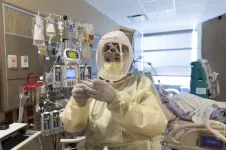(Press-News.org) Transcatheter mitral valve repair for heart failure patients with mitral regurgitation can reduce the long-term rate of hospitalizations by almost 50 percent, and death by nearly 30 percent, compared with heart failure patients who don’t undergo the minimally invasive procedure.
These are the breakthrough findings from a new study led by a researcher from the Icahn School of Medicine at Mount Sinai. This multi-center trial is the largest trial to examine the safety and effectiveness of transcatheter mitral-valve repair in a heart failure population using Abbott’s MitraClip system. It shows this treatment option significantly improves outcomes for patients with heart failure that do not respond to conventional treatments.
The five-year results from the “Cardiovascular Outcomes Assessment of the MitraClip Percutaneous Device” study, or COAPT, were announced Sunday, March 5, in a Late Breaking Clinical Trial presentation at the American College of Cardiology Scientific Sessions Together with World Congress of Cardiology (ACC.23/WCC) in New Orleans, and published in The New England Journal of Medicine.
“Treating severe secondary mitral regurgitation in appropriate patients with cardiomyopathy is important—our study shows that five years after the MitraClip procedure, patients feel better, are hospitalized less frequently, and live longer,” says lead author Gregg W. Stone, MD, Director of Academic Affairs for the Mount Sinai Health System and Professor of Medicine (Cardiology), and Population Health Science and Policy, at Icahn Mount Sinai. “It’s critical for physicians to recognize mitral regurgitation in patients with cardiomyopathy, then treat this secondary issue as early as possible to improve outcomes in this heart failure group.”
Roughly 30 percent of patients with left ventricular cardiomyopathy—the most common type of heart failure, in which the heart’s main chamber (the left ventricle) becomes enlarged and can’t properly pump blood out of the heart—develop a secondary heart condition called severe mitral valve regurgitation. Secondary mitral valve regurgitation develops when the mitral valve, which controls the flow of blood from the left atrium into the left ventricle, becomes distorted from the enlarged left ventricle so its leaflets do not completely close. This causes blood to leak backwards, increases the pressure in the heart, and puts patients at increased risk of hospitalization and death. In most patients, this condition can be treated with a minimally invasive procedure called transcatheter edge-to-edge repair (TEER) in which the leaflets of the mitral valve are clipped together. The procedure is commonly performed with a device called the MitraClip, manufactured by Abbott.
In the COAPT study, researchers investigated whether treating the severe secondary mitral valve regurgitation with TEER, which has no direct effect on the underlying weakened heart muscle, would improve overall outcomes in heart failure patients beyond medical therapy alone. The two-year results, published in 2018, showed for the first time that treating secondary mitral valve regurgitation improved patients’ symptoms, reduced hospitalizations, and led them to live longer. Their latest five-year results show further significant findings.
Researchers analyzed 614 patients enrolled between December 27, 2012, and June 23, 2017, at 78 sites in the United States and Canada. All patients had cardiomyopathy and secondary, severe mitral valve regurgitation despite treatment with optimal medical therapy for heart failure. Half of those patients continued their heart failure medication, while the other half underwent transcatheter valve repair with the MitraClip while continuing on the heart failure medication. Over the five years following treatment, the yearly rates of heart failure hospitalizations were 33.1 percent in the MitraClip group compared to 57.2 percent with patients treated with medications only, which was a 47 percent reduction. Deaths from heart failure were reduced by 29 percent in the MitraClip group compared with patients treated with medications only, and all-cause death was reduced by 28 percent.
Even though patients in the MitraClip group had fewer deaths and hospitalizations after successful treatment, at the end of five years, 73.6 percent of them died or had one or more heart failure hospitalizations (compared to 91.5 percent of patients in the medication-only group). Dr. Stone says this result highlights the need for advanced therapies to treat these high-risk patients.
“Within five years, heart failure patients treated with MitraClip were on average alive and out of the hospital for 229 days more—nearly 8 months—than patients treated with medications alone. Thus, MitraClip treatment provided great benefits for these patients in terms of longevity and quality of life,” noted Dr. Stone. “However, the TEER procedure doesn’t cure the underlying damaged heart muscle, and the long-term survival of these patients is worse than for many cancers. New medical therapies and long-term device-based treatments for heart failure that can lower the pressures and blood volume within the heart or take over its pumping function are essential to further improve the quality of life and longevity in these desperate patients.”
This study was funded by Abbott.
Mount Sinai Heart is one of the world’s top hospitals in Cardiology/Heart Surgery
Mount Sinai Heart is among the top 6 in the nation for cardiology and cardiac surgery, according to U.S. News & World Report. Newsweek’s “The World’s Best Specialized Hospitals” ranks Mount Sinai Heart as No. 1 in New York and No. 4 globally.
It is part of Mount Sinai Health System, which is New York City's largest academic medical system, encompassing eight hospitals, a leading medical school, and a vast network of ambulatory practices throughout the greater New York region. We advance medicine and health through unrivaled education and translational research and discovery to deliver care that is the safest, highest-quality, most accessible and equitable, and the best value of any health system in the nation. The Health System includes approximately 7,300 primary and specialty care physicians; 13 free-standing joint-venture centers; more than 410 ambulatory practices throughout the five boroughs of New York City, Westchester, and Long Island; and more than 30 affiliated community health centers. The Mount Sinai Hospital is ranked in U.S. News & World Report's "Honor Roll" of the top 20 U.S. hospitals and among the top in the nation by specialty: No. 1 in Geriatrics and top 20 in Cardiology/Heart Surgery, Diabetes/Endocrinology, Gastroenterology/GI Surgery, Neurology/Neurosurgery, Orthopedics, Pulmonology/Lung Surgery, Urology, and Rehabilitation.
For more information, visit https://www.mountsinai.org or find Mount Sinai on Facebook, Twitter and YouTube.
###
END
Transcatheter mitral valve repair in heart failure patients significantly reduces hospitalizations and improves survival
2023-03-05
ELSE PRESS RELEASES FROM THIS DATE:
COVID-19 infection leads to increased rates of chest pain six months to a year after infection in patients
2023-03-05
Even patients with mild COVID-19 infections can suffer from health complications for months, even years, post infection. Nearly 19% of U.S. adults who had previously tested positive for COVID-19 report having “Long COVID,” where they experience signs and symptoms for four weeks or more after the initial phase of infection.
In an effort to quantify what Long COVID means now, and could mean in the future for these patients, researchers from Intermountain Health in Salt Lake City studied nearly 150,000 ...
Humanity’s quest to discover the origins of life in the universe
2023-03-04
“We are living in an extraordinary moment in history,” says Didier Queloz, who directs ETH Zurich’s Centre for Origin and Prevalence of Life and the Leverhulme Centre for Life in the Universe at Cambridge. While still a doctoral student Queloz was the first to discover an exoplanet - a planet orbiting a solar-type star outside of Earth’s solar system. A discovery for which he would later receive a Nobel Prize in physics. Within a generation, scientists have now discovered more than 5,000 exoplanets and predict the potential existence of trillions more in the Milky Way galaxy alone. Each ...
COVID-19 pandemic increased rates and severity of depression, whether people were infected or not
2023-03-04
The COVID-19 pandemic impacted just about every part of people’s lives. Quarantining, social distancing, societal disruptions and an ever-shifting, uncertain landscape of rules and restrictions and variants created stress and isolation that impacted the mental health of millions of Americans.
Now, in a new study of nearly 136,000 patients from Intermountain Health in Salt Lake City, researchers found that depressive symptoms and severity of depression was significant among all patients in the study, regardless ...
Researchers study how underserved farmers can improve crop, impact climate change
2023-03-04
University of Houston researchers are developing a program to teach small-scale, underserved and limited resources (SULR) farmers how to improve their crop production by reducing greenhouse gas emissions and increasing carbon removal.
The work is supported by a nearly $5 million grant from the US Department of Agriculture (USDA) Natural Resources Conservation Service. Researchers will partner with colleagues from Prairie View A&M University, Texas A&M University and Michigan Aerospace Corp. to study how best to implement a Climate-Smart ...
Connect to protect
2023-03-04
On Mar. 2, the first evening of the Our Ocean Conference in Panama City, Panama, a distinguished group hosted by the Smithsonian Tropical Research Institute (STRI), the Bezos Earth Fund, Re:wild and Pew Bertarelli Ocean Legacy gathered at Panama’s BioMuseo to celebrate their commitment to conserve a sustainable and resilient Eastern Tropical Pacific Ocean (ETP).
The event recognized significant contributions by the public sector—especially the governments of Panama, Colombia, Costa Rica, and Ecuador; the private sector; civil society, the scientific sector; together with generous philanthropists, ...
Sea level rise poses particular risk for Asian megacities
2023-03-04
Sea level rise this century may disproportionately affect certain Asian megacities as well as western tropical Pacific islands and the western Indian Ocean, according to new research that looks at the effects of natural sea level fluctuations on the projected rise due to climate change.
The study, led by scientists at the French National Center for Scientific Research (CNRS) and University of La Rochelle in France and co-authored by a scientist at the National Center for Atmospheric Research (NCAR), mapped sea level hotspots around the globe. The research team identified several ...
Rhythmic eating pattern preserves fruit fly muscle function under obese conditions
2023-03-04
BIRMINGHAM, Ala. – Obese fruit flies are the experimental subjects in a Nature Communications study of the causes of muscle function decline due to obesity. In humans, skeletal muscle plays a crucial role in metabolism, and muscle dysfunction due to human obesity can lead to insulin resistance and reduced energy levels.
Interestingly, studies in various animal models have shown that time-restricted feeding — a natural non-pharmaceutical intervention — protects against obesity, aging and circadian disruption in peripheral tissues such as skeletal muscle. However, the mechanisms underlying those ...
New tool for organ repair: Curvature of the environment
2023-03-04
A ball, a saddle, or a flat plate. The curvature of biomaterials inhibits or stimulates bone cells to make new tissue. This is what TU Delft engineers show in research published on Friday, 3rd of March in Nature Communications. This study of geometries could be an important step in research into repairing damaged tissues.
Living cells can perceive and respond to the geometry of their environment. ‘Cells sense and respond to the geometry of the surfaces they are exposed to. Depending on their curvature, surfaces can either encourage cells to create new tissue or prevent them from doing so,’ says Amir Zadpoor, ...
Military veterans face increased risk of HPV-related cancer due to low vaccination rates
2023-03-04
Human papillomavirus (HPV) vaccination rates among eligible veterans and active-duty military are half that of their civilian peers, putting them at greater risk of HPV-related cancers. That’s according to a new study published today in JAMA Oncology that provides the first national estimate of HPV vaccination rates in this population.
“Our findings should serve as a call to action to the Department of Defense and the Veterans Health Administration to advocate that their service members get vaccinated,” said senior author José P. Zevallos, ...
Innovative technology shows great promise against certain head and neck cancers
2023-03-04
Over the past decade, human papillomavirus (HPV) has increasingly been identified as a significant cause of certain head and neck cancers – for example, evidence suggests it causes 70% of oropharyngeal cancers in the United States.
Further, over the past three decades, incidence of HPV-driven cancers has increased substantially worldwide and in the U.S. While there are well-established screening tools, as well as vaccines, for HPV-driven cancers such as cervical cancer, there are fewer resources for HPV-driven head and neck cancers. As a result, researchers are working with a sense of urgency to develop innovative ...





